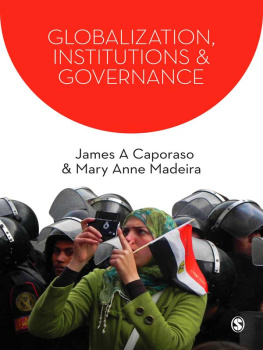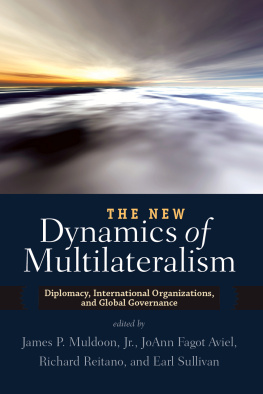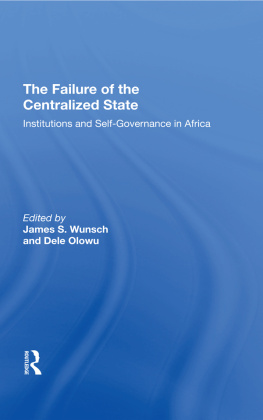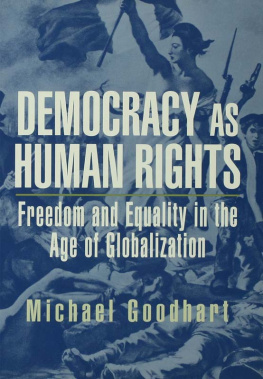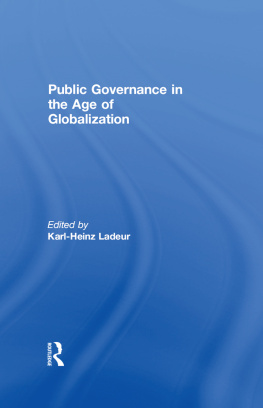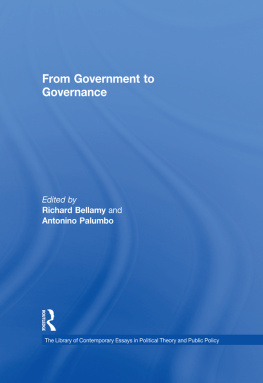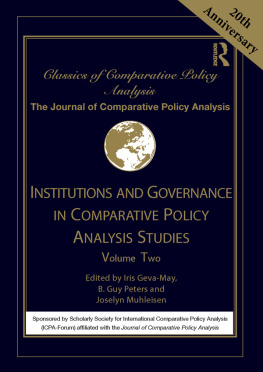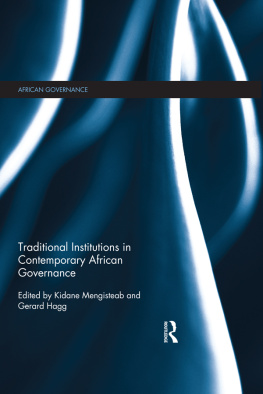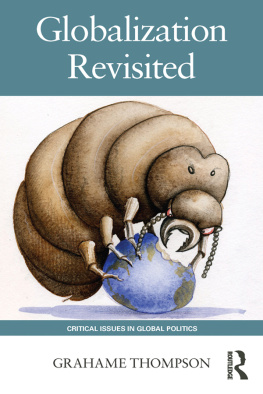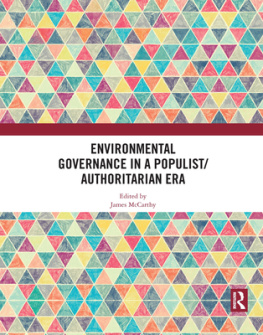GLOBALIZATION, INSTITUTIONS & GOVERNANCE
SAGE Series on the Foundations of International Relations
Series Editors: Walter CarlsnaesUppsala University, Sweden
Jeffrey T. CheckelSimon Fraser University, Canada
International Advisory Board: Peter J. Katzenstein Cornell University, USA; Emanuel Adler University of Toronto, Canada; Martha Finnemore George Washington University, USA; Andrew Hurrell Oxford University, UK; G. John Ikenberry Princeton University, USA; Beth Simmons Harvard University, USA; Steve Smith University of Exeter, UK; Michael Zuern Hertie School of Governance, Germany.
This series fills the gap between narrowly focused research monographs and broad introductory texts, providing graduate students with state-of-the-art, critical overviews of the key sub-fields within International Relations: International Political Economy, International Security, Foreign Policy Analysis, International Organization, Normative IR Theory, International Environmental Politics, Globalization, and IR Theory.
Explicitly designed to further the transatlantic dialogue fostered by publications such as the SAGE Handbook of International Relations, the series is written by renowned scholars drawn from North America, continental Europe and the UK. The books are intended as core texts on advanced courses in IR, taking students beyond the basics and into the heart of the debates within each field, encouraging an independent, critical approach and signposting further avenues of research.
GLOBALIZATION, INSTITUTIONS & GOVERNANCE
James A Caporaso & Mary Anne Madeira
James A. Caporaso and Mary Anne Madeira, 2012
First published 2012
Apart from any fair dealing for the purposes of research or private study, or criticism or review, as permitted under the Copyright, Designs and Patents Act, 1988, this publication may be reproduced, stored or transmitted in any form, or by any means, only with the prior permission in writing of the publishers, or in the case of reprographic reproduction, in accordance with the terms of licences issued by the Copyright Licensing Agency. Enquiries concerning reproduction outside those terms should be sent to the publishers.
SAGE Publications Ltd
1 Olivers Yard
55 City Road
London EC1Y 1SP
SAGE Publications Inc.
2455 Teller Road
Thousand Oaks, California 91320
SAGE Publications India Pvt Ltd
B 1/I 1 Mohan Cooperative Industrial Area
Mathura Road
New Delhi 110 044
SAGE Publications Asia-Pacific Pte Ltd
33 Pekin Street #02-01
Far East Square
Singapore 048763
Library of Congress Control Number available
British Library Cataloguing in Publication data
A catalogue record for this book is available from the British Library
ISBN 978-1-4129-3492-3
ISBN 978-1-4129-3493-0 [pbk]
Typeset by C&M Digitals (P) Ltd, Chennai, India
Printed in India at Replika Press Pvt Ltd
Printed on paper from sustainable resources
CONTENTS
LIST OF FIGURES AND TABLES
ACKNOWLEDGEMENTS
As with most things we produce, a book is a social product, the result of connections and debts too numerous and too invisible to recount. The curiosity and stimulation of students, at both the undergraduate and graduate levels, were crucial for the senior author. But the biggest debt of both authors is to the academic editors of this series, Jeff Checkel and Walter Carlsnaes, as well as to Sage editor David Mainwaring. Jeff and Walter not only convinced us to write the book but also guided us through at least two rounds of revisions. Their comments got us to think about the book in different ways and led to serious revisions, revisions which we think resulted in a much better book. While the readers will not be able to do the comparison, we hope they agree that it was worth the effort.
Globalization: A Rapidly Changing Field
Globalization confronts all of us, even casual observers, with a bewildering range of observations. One does not have to go far to take notice of these events. At the time of this writing, the European Union (EU) contemplates the rescue of Greece from its budgetary troubles; Iceland, as close to sovereign bankruptcy as a country can get, is struggling with repayment of its huge external debt to the Netherlands and Great Britain; and the hugely successful private company, Google, is considering pulling out of China because of Chinese censorship and human rights violations. German and American fiscal authorities do battle with individuals who would escape the control of national taxation systems by putting money outside the reach of their own governments. In addition, riots continue between migrant workers from Africa and Italians in Calabria, and the Swiss Peoples Party votes in favour of a referendum to ban the building of minarets by Muslims in Switzerland. State and non-state actors are important, and motivations range from principled concerns about human rights to attention to the bottom-line profits and position in the international distribution of power.
The Italian and Swiss examples are telling. The town of Rosarno in Calabria (at the tip of the boot in Southern Italy) relies on migrant labour from the Maghreb and sub-Saharan Africa to pick its citrus fruit. The workers live in very poor conditions and receive perhaps 25 euros a day as their wages, of which they must hand over a portion to the local mafia called the Ndrangheta. Reports indicate that two of the workers were shot by locals while they were in their camp. Riots ensued in which many were injured. The result was that well over a thousand African workers either left voluntarily or were removed by the police (Economist, Jan. 19, 2010: 1). The situation was brought to a point by the fact that it appeared not profitable to pick the fruit at all, since the Italian economy had been flooded by cheap Spanish oranges and Brazilian orange juice. It seems that even the low agricultural wages of southern Italy were not low enough, in the sense that competition both inside and outside the EU could undercut local prices. While tariff protection may be an option in some countries, it is not viable within the EU owing to the free movement provisions of the Lisbon Treaty (the governing Treaty of the EU), and tariffs against Brazil are heavily discouraged by the World Trade Organization (WTO). Thus, from the standpoint of local producers, workers (domestic and migrant workers), and consumers, there are few options. The constraints implied by Thomas Friedmans golden straitjacket are all too prevalent here but the gold (symbol for the economic benefits) is hard to find (Friedman, 2000 [1999]). Indeed, both Italians and African workers could ask whats so golden about this straitjacket?
The situation in Switzerland is interesting because it demonstrates a significant anti-immigrant movement in an environment where the immigrant presence is not very pronounced. There are approximately 340,000 Muslim immigrants in Switzerland, about 4 per cent of the population, and most of them are from the Balkans and Turkey, two of the more liberal (non-fundamentalist) Muslim countries. Furthermore, the issue on which the Swiss referendum was held had to do with the building of minarets, of which there are only four in all of Switzerland. Yet, the xenophobic Swiss Peoples Party, which is one of the largest parties in Switzerland, succeeded in leading the campaign against the building of minarets. This campaign relied on a sophisticated approach focusing not on television advertisements but on the power of a fixed image. One of the two most important posters showed minarets positioned as ballistic missiles emerging out of the Swiss flag, an image which was shown in conjunction with another poster of a woman in a niqab, a full-length garment, with the word STOPP in large red letters. Underneath, at the very bottom of the poster, was a large green JA, along with zur Minarett-Verbots-Initiative. In other words, stop the building of minarets. Say yes to forbidding the building of minarets (


